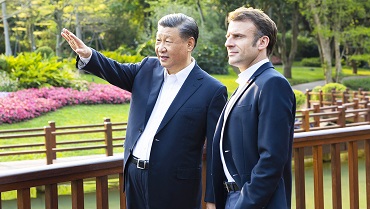The Australian Alert Service is the weekly publication of the Australian Citizens Party.
It will keep you updated on strategic events both in Australia, and worldwide, as well as the organising activities of the Citizens Party.
To subscribe to the Australian Alert Service, it's easy, and it's secure.
Lead Editorial
12 April 2023
Vol. 25 No. 15
Amidst the dangerous geopolitical developments that enhance the imminent risk of a thermonuclear world war, countervailing developments show a pathway to a peaceful new order is emerging. At issue is whether the Anglo-American elite would rather destroy the world than relinquish their unipolar power, or whether they will accept the reality of an emerging multipolar world order, and choose the path of peaceful cooperation.
Under the headline “US Strategy Plan Calls For Ensuring No Rivals Develop”, the 8 March 1992 New York Times reported, “In a broad new policy statement that is in its final drafting stage, the Defence Department asserts that America’s political and military mission in the post-cold-war era will be to ensure that no rival superpower is allowed to emerge in Western Europe, Asia or the territory of the former Soviet Union.” Thus was defined the Anglo-American unipolar world order— known as the “Wolfowitz Doctrine” after US Under-Secretary of Defence Paul Wolfowitz who drafted it—in which American military might would enforce a dollar-based financial empire ruled by an Anglo-American elite whose power rested in the City of London and Wall Street. At the time of this statement, Anglo-American financial marauders were swarming over the economy of the former Soviet Union, demonstrating the true nature of the London-Wall Street system by plundering their former adversary’s wealth through mass-privatisation. Meanwhile, still-poor China had embarked on its path to economic development, but without giving up its political and economic sovereignty. China’s subsequent rise, coinciding with the USA’s self-inflicted economic decline, put the two nations on a collision course that is entirely unnecessary. The United States has the choice—which its true friends would urge it to take—of renouncing the Wolfowitz doctrine and accepting the rise of China and a multipolar world. If not, the USA will instead be choosing war, because by clinging to unipolarity it is demanding that China end its economic rise, which is never going to happen.
The undeniable, unstoppable reality of the emerging multipolar world was demonstrated this week by French President Macron’s state visit to China. Macron is far from a great leader; in fact, his country is wracked with never-ending public protests against his various disastrous domestic policies. But as a president of France, Macron is expected to act independently in his nation’s interest, in a way that seems foreign to Australians, so accustomed as we are to our leaders outsourcing our foreign policy to the UK and USA. Macron became the most senior political leader in the NATO alliance to acknowledge the decline of, and advocate reducing dependence on, the US dollar, which is the cornerstone of US economic power. He also declared, rightly, that the Chinese province of Taiwan is none of Europe’s business—at the very time Taiwan’s President was engaged in yet another provocation with the United States, travelling to meet the new Speaker of the House of Representatives. Macron’s statements have sparked extreme consternation in the USA and UK and NATO, where they are seen as breaking ranks.
The truth is the Anglo-American path of plundering nations—even their own populations—through financial looting and costly wars means they cannot match China’s economic pull, which has steadily grown as China has invested in its infrastructure and national economic development, and shared its successful approach with the world. Australia also demonstrates that reality: as sycophantic as our leaders are to the Anglo-Americans, manifested in selling out our sovereignty through AUKUS, they can’t help but be ecstatic when China agrees to trade breakthroughs, such as in the dispute over barley. Interestingly in this context, Prime Minister Anthony Albanese this week has reportedly turned down the invitation to attend the upcoming NATO summit in Lithuania, which is apparently a great disappointment in Brussels.
These developments show the progress to multipolarity is chaotic, but it’s real. We must shape this progress inside Australia, by showing that our vision for economic development is the pathway to peace.
In this issue:
- 48 Australian Parliamentarians call for US to end extradition of Assange
- Australia’s housing crisis worsens—for buyers, renters and landlords alike
- NZ needs to distance itself from Australia’s anti-China nuclear submarines
- NZ Parliamentary Motion on Human Rights Abuses in Xinjiang
- KMT and US intelligence agencies collaborate
- USA-UK wage clandestine war against Russia
- US Rep. Paul Gosar: I believe in peace, not war
- More towns push banking solutions
- Banking solutions surface amid crisis
- ALMANAC: An alternative model of global politics emerges
Click here to find out how to subscribe. For freely available AAS articles, click here.
Click here for the archive of previous issues of the Australian Alert Service








